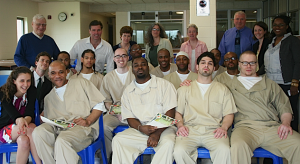Center for Prison Education Receives $300,000 Grant from Ford Foundation
The Center for Prison Education has received a grant of $300,000 from the Ford Foundation, supporting the continuation of the program which has delivered a Wesleyan education to Connecticut prisons since 2009.
The grant will not only help fund the classes taught at the Cheshire and York Correctional Institutions, but also support CPE’s re-entry services, which assist students who complete their sentences in continuing their college education post-release.
“Support from the Ford Foundation recognizes the necessity of bringing educational opportunities to our prisons, the success of the Center for Prison Education’s model for doing so, and the ability of incarcerated students to meet the challenges of even the most demanding liberal arts education,” said Dara Young, manager of the CPE.

Under the CPE program, Wesleyan faculty teach 36 students at Cheshire Correctional Institution, a men’s maximum-security facility, and 17 students at York Correctional Institution (the state’s only women’s facility) in classes ranging from geology to comparative politics. The admissions process is rigorous and selective. Wesleyan student volunteers serve as writing tutors and teaching assistants, and CPE provides students with all textbooks and required readings and school supplies.
CPE’s mission is informed by research that shows the rate of return to prison – recidivism – is reduced by education. Studies have found that participation in postsecondary education while incarcerated can reduce rates of recidivism by more than 40 percent. Further, CPE believes that an investment in individuals is also in the communities and families to which the prisoners belong.
“Studies show that education makes an important difference in the lives of incarcerated people, especially after they are released, and we are proud to contribute to this process,” said Wesleyan President Michael Roth.
Professor of Government Peter Rutland, who taught in Cheshire during the Fall 2013 semester, enjoyed the experience. He found his assumptions about prison teaching challenged with every class.
“I was teaching my standard undergraduate course ‘Democracy and Dictatorship,’” Rutland said. “They (his CPE students) enthusiastically embraced Elite Theory, but with a couple of exceptions were skeptical of critical theory and Marxist approaches. They were cautiously accepting of the liberal paradigm, as one of them said, ‘we could do with a little liberalism around here.’”
CPE is the only college-in-prison program in Connecticut.

